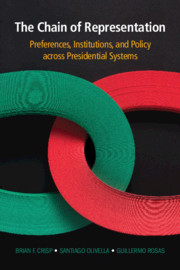'This very important book applies the logic of institutional design and sequential stages of representation to describe and explain the connections between citizens and policies in presidential democracies. The ‘separation-of-powers’ systems of Latin America, with their directly elected chief executives and greatly varying policymaking powers, provide an additional level of institutional variation. Its incorporation in this book makes a unique and memorable contribution to the representation literature.'
G. Bingham Powell, Jr - University of Rochester
'This book represents a genuine breakthrough in systematic understanding of the ‘chain’ that links policy outcomes to citizens’ preferences in democracies - and not only in its Latin American setting. By developing a common scale for the ‘moods’ of citizens and elected officials, as well as for actual policy outcomes, the book shows how electoral systems and the separation of powers shape degrees of democratic responsiveness.'
Matthew S. Shugart - Distinguished Professor of Political Science, University of California, Davis
'The pathway from public opinion to policy is exceedingly complex, but Crisp, Olivella, and Rosas accomplish the seemingly insurmountable task of bringing into a single analysis this entire chain - voter preferences, electoral systems, leader preferences, executive/legislative relations, and policy outputs. This book is now required reading for scholars not just of Latin America but of the relationships between any of these links in the chain of representation.'
Andy Baker - University of Colorado, Boulder
'Democratic institutions give voters the power to select self-interested politicians that implement the policies that voters want. Simple enough if voters know what they want, politicians do as they are told, and policies perform as expected. In The Chain of Representation, Crisp, Olivella, and Rosas, present an elegant integrated model to understand how congruent voters, politicians, and policy outcomes are. Who in political science has not dreamt of a book that effortlessly connects all stages of democratic representation into an integrated model? I know I have.'
Ernesto Calvo - University of Maryland
‘... the book describes a fascinating set of regional trends ...’
Emily Beaulieu Bacchus
Source: Comparative Politics



